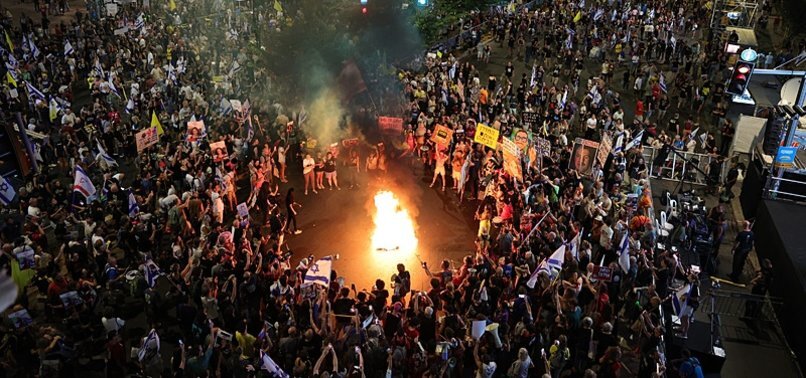Inferno of frustration: Fury sweeps Israel as captive crisis deepens

Flames of anger have enveloped Israelis in the wake of their army’s failure to make good on its promises in the ongoing war against the Gaza Strip.
A large number of people across Israel once again took to the street at the weekend to express their deep frustration with the cabinet of Prime Minister Benjamin Netanyahu.
Organizers said hundreds of thousands of people participated in protests in Tel Aviv on Saturday night. Tens of thousands of others attended rallies in Jerusalem (al-Quds), Haifa and elsewhere.
They are absolutely furious that Netanyahu has not succeeded in securing the release of Israeli captives in Gaza.
Israel launched war on Gaza on October 7 after Hamas carried out Al-Aqsa Storm Operation. It was a surprise attack in southern Israel that humiliated the regime and exposed its vulnerability in the face of growing power of Palestinian resistance.
More than 1,100 Israelis and foreigners were killed in the Hamas operation and around 250 others were taken captive.
The ensuing Israeli war of genocide on Gaza has also claimed the lives of more than 41,300 Palestinians.
Netanyahu has vowed to continue the war until achieving “total victory” over Hamas and "destroying" the resistance group. However, Israeli officials have acknowledged that the objectives set by the prime minister will remain unattainable.
Israeli protesters are fed up with army’s inability to secure the release of captives held in GazaIsraeli war minister Yoav Gallant has dismissed Netanyahu’s “total victory” slogan as “gibberish”.
Netanyahu, known as Bibi, has asserted that military operations are the only means to create the conditions necessary for the release of captives in Gaza.
But Israel was able to release more than 100 captives only through a swap deal with Hamas in November last year.
It is believed that about 100 captives remain in Gaza, including the bodies of at least 33 confirmed dead by the Israeli army.
The army has recovered the bodies of 37 captives who were killed during the regime’s attacks in Gaza. It has also freed eight other captives following deadly raids in Gaza.
Israel’s ongoing war on the enclave comes as the regime has intensified its attacks against Lebanon under the pretext of targeting the positions of the Hezbollah resistance group.
Einav Zangauker, whose son is held captive in Gaza, said during the Saturday rallies that Netanyahu has faced with the choice of agreeing to a deal for the return of the captives or escalating the fighting with Hezbollah. Zangauker added that the premier has chosen “regional escalation, and decided to sacrifice the hostages on the altar of keeping his seat.”
Another protester also accused far-right ministers in the Netanyahu coalition of intentionally preventing a deal with Hamas. “Throughout the year there were opportunities for a deal, and you [the Netanyahu cabinet] didn’t take them.”
Clashes erupted during the protests and police made arrests.
Israeli demonstrators accuse PM Netanyahu of sacrificing captives for his political survival In Caesarea, protesters gathered in front of Netanyahu’s private residence and blocked traffic until they were forcibly dispersed by police.
Protests demanding a captive deal with Hamas have been held every Saturday night since the first weeks of the Gaza war.
Protesters have also called for Netanyahu’s resignation and early elections.
In recent days, relatives of captives have stressed that they are increasingly pessimistic about the prospects for a deal, in part because of the shift in the focus of the war toward Lebanon.
They have realized that the Israeli army is not capable of bringing regional resistance movements to their knees. Hence, they have exerted pressure on officials to engage in dialogue with Hamas to protect the lives of the remaining captives.
But Netanyahu has remained defiant in the face of public demands to reach a ceasefire with Hamas. This is because his political survival depends on prolonging the conflict. A permanent state of war helps Netanyahu evade responsibility for his failure to prevent the Al-Aqsa Storm.
As soon as the onslaught ends, the Israeli prime minister will be held accountable for his regime’s military fiasco on October 7. He is also trying to distract from his corruption charges and controversial judicial reforms which had sparked huge protests in Israel.
But in the eyes of Western countries including the US, Israel’s survival is a priority. Another person may succeed Netanyahu, but such a replacement will not improve the circumstances of Palestinians who have endured the Israeli system of apartheid for decades. This is because the ethnic cleansing of Palestinians is inherently linked to the fundamental characteristics of Israelis, regardless of their political affiliations.
Leave a Comment